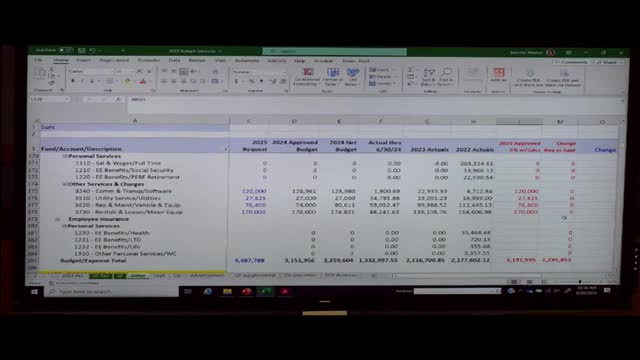Election Board Demands Fair Pay Amid Growing Responsibilities
August 26, 2024 | Tippecanoe County, Indiana
This article was created by AI summarizing key points discussed. AI makes mistakes, so for full details and context, please refer to the video of the full meeting. Please report any errors so we can fix them. Report an error »

In a recent government meeting, officials discussed critical updates regarding salary adjustments for election board members and the implications of upcoming legislative changes on voter registration processes. The meeting highlighted the necessity to comply with new federal guidelines that mandate an increase in salaries for certain exempt positions, specifically affecting two roles within the election board.
Sadie, a key participant in the discussion, confirmed that the new federal minimum salary for exempt employees would raise the salaries to $58,656 for the affected positions. This adjustment is essential to ensure compliance with the Fair Labor Standards Act (FLSA) guidelines.
The conversation then shifted to the compensation of election board members during non-election years. Historically, Tippecanoe County has not compensated board members during these years, a practice that has come under scrutiny. Julie, a board member, emphasized that the board's responsibilities extend beyond election periods, including ongoing voter registration and compliance with new proof of residency and citizenship laws. She argued that the workload remains significant, necessitating full compensation to maintain effective governance and oversight.
Randy Vonderheit, the board chairman, expressed concerns about the challenges of attracting qualified candidates for board positions if compensation remains low. He noted that previous cuts to board member pay have made it difficult to fill vacancies, which could hinder the board's ability to function effectively.
The discussion also touched on the need for a comprehensive review of the county's voting procedures and equipment, which have not been updated since 2006. This overhaul is deemed crucial to address technological advancements and security requirements, particularly in light of increasing demands from the General Assembly.
Several council members voiced their support for maintaining full pay for board members, recognizing the extensive work that continues even in non-election years. However, some expressed caution about setting a precedent for treating board members as employees rather than volunteers, suggesting a potential compromise of half pay for non-election years.
The meeting concluded with a consensus on the importance of documenting the board's activities and workload to provide transparency and accountability in future discussions about compensation. As the county prepares for the upcoming year, officials are committed to ensuring that the election board is adequately supported to fulfill its critical role in maintaining fair and efficient elections.
Sadie, a key participant in the discussion, confirmed that the new federal minimum salary for exempt employees would raise the salaries to $58,656 for the affected positions. This adjustment is essential to ensure compliance with the Fair Labor Standards Act (FLSA) guidelines.
The conversation then shifted to the compensation of election board members during non-election years. Historically, Tippecanoe County has not compensated board members during these years, a practice that has come under scrutiny. Julie, a board member, emphasized that the board's responsibilities extend beyond election periods, including ongoing voter registration and compliance with new proof of residency and citizenship laws. She argued that the workload remains significant, necessitating full compensation to maintain effective governance and oversight.
Randy Vonderheit, the board chairman, expressed concerns about the challenges of attracting qualified candidates for board positions if compensation remains low. He noted that previous cuts to board member pay have made it difficult to fill vacancies, which could hinder the board's ability to function effectively.
The discussion also touched on the need for a comprehensive review of the county's voting procedures and equipment, which have not been updated since 2006. This overhaul is deemed crucial to address technological advancements and security requirements, particularly in light of increasing demands from the General Assembly.
Several council members voiced their support for maintaining full pay for board members, recognizing the extensive work that continues even in non-election years. However, some expressed caution about setting a precedent for treating board members as employees rather than volunteers, suggesting a potential compromise of half pay for non-election years.
The meeting concluded with a consensus on the importance of documenting the board's activities and workload to provide transparency and accountability in future discussions about compensation. As the county prepares for the upcoming year, officials are committed to ensuring that the election board is adequately supported to fulfill its critical role in maintaining fair and efficient elections.
View full meeting
This article is based on a recent meeting—watch the full video and explore the complete transcript for deeper insights into the discussion.
View full meeting
